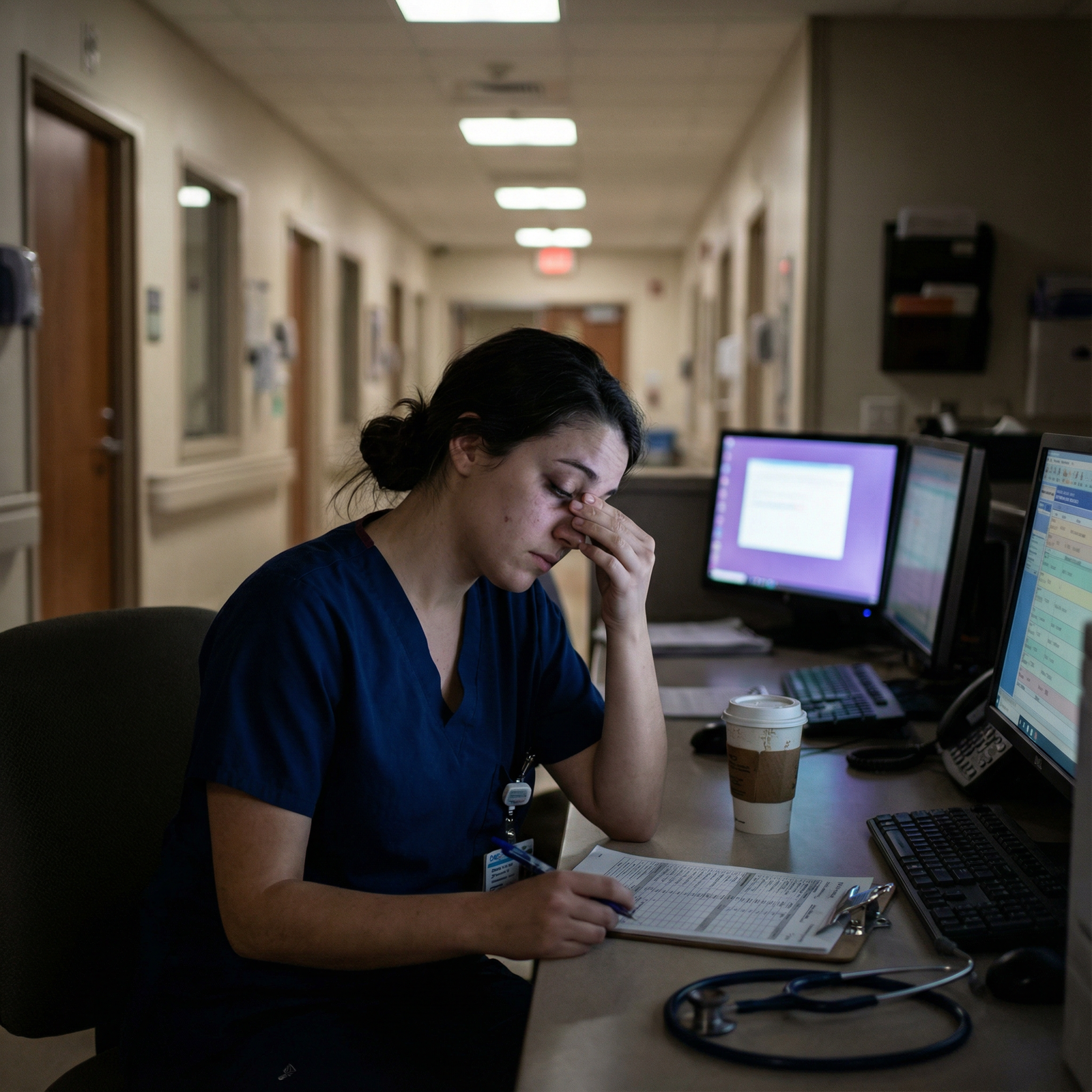
Long hours during medical residency have become a defining—and often controversial—feature of physician training. For decades, residents have shouldered intense workloads and extended shifts in the name of education, continuity of care, and professional “toughness.” At the same time, an ever-growing body of evidence links these prolonged hours to sleep deprivation, impaired well-being, and risks to patient care.
For medical students considering residency and physicians currently in training, understanding how residency work hours shape health, learning, and performance is essential. This article examines the impact of long residency hours on residents’ physical and mental health, the quality and safety of patient care, and the effectiveness of physician training. It also explores strategies to protect your well-being while still meeting the demands of medical residency.
Understanding Residency Hours and Duty Hour Regulations
Residency is the bridge between medical school and independent practice, typically lasting three to seven years depending on specialty. During this phase of physician training, residents are both learners and front-line clinicians, often responsible for high-acuity patients and complex care coordination.
Typical Workload and Shift Patterns
In many programs, especially in high-intensity specialties such as surgery, internal medicine, emergency medicine, and critical care, it is common for residents to:
- Work 60–80+ hours per week, particularly on inpatient or ICU rotations
- Take overnight call or 24-hour (or longer) shifts, depending on local rules and specialty
- Cover weekends and holidays, sometimes with little recovery time afterward
- Manage a combination of day shifts, night shifts, and swing shifts, which can disrupt circadian rhythms
Even with duty-hour rules, many residents report that “80 hours” is not just a cap but an expectation, especially in busy academic centers.
The Role of ACGME Duty Hour Standards
The Accreditation Council for Graduate Medical Education (ACGME) introduced duty hour regulations to address concerns about fatigue, medical errors, and resident well-being. Key elements of the current rules (which may vary slightly by specialty and year) include:
- Maximum 80 hours per week, averaged over four weeks, inclusive of in-house call and clinical duties
- Minimum one day off in seven, averaged over four weeks
- Limits on continuous duty (e.g., 24 hours of clinical care with a short period for transitions, depending on specialty regulations)
- Strategic rest and time off between shifts (e.g., 8–10 hours between duty periods, 14 hours after extended shifts, per specific program policies)
Initially, first-year residents (PGY-1) were restricted to 16-hour shifts, but later revisions in some specialties allowed longer shifts with supervision, citing continuity of care and educational opportunities.
Despite these changes, a central tension remains: how to provide comprehensive training and safe, continuous patient care without compromising resident health and well-being.
The Economic, Physical, and Cognitive Toll of Long Residency Hours
Residency is demanding by design, but when long work hours combine with inadequate recovery, the effects on the body and brain can be substantial. Sleep deprivation sits at the center of this problem.
Sleep Deprivation as a Core Challenge
Many residents report getting less than six hours of sleep per 24-hour period during demanding rotations. Chronic partial sleep loss—sleeping 5–6 hours per night for days or weeks—has cumulative effects similar to pulling an all-nighter.
Consequences of sleep deprivation during medical residency include:
- Slower reaction times and impaired attention
- Reduced working memory, making it harder to track multiple tasks, lab results, and active problems
- Compromised executive function, leading to poor prioritization and decision-making
- Mood changes, including irritability, low frustration tolerance, and emotional exhaustion
Research in journals such as JAMA and Sleep has shown that residents working extended shifts perform at a level comparable to someone with a blood alcohol concentration above legal driving limits. Yet they are still making critical decisions in patient care.
Increased Error Rates and Safety Risks
When examining the intersection of sleep deprivation and patient care, multiple studies have demonstrated that:
- Residents working extended-duration shifts (24+ hours) are more likely to make serious medical errors
- Error types include medication dosing errors, missed or delayed recognition of clinical deterioration, and documentation or order entry mistakes
- Residents are also at increased risk for needlestick injuries, bloodborne exposure, and driving accidents after overnight call
While residency is about learning through experience, fatigue can undermine even well-trained clinical judgment. This is a major concern for patient safety and for residents’ own physical safety.
Long-Term Physical Health Consequences
Persistent sleep deprivation and high workload during medical residency can contribute to:
- Cardiovascular strain: Elevated blood pressure, heart rate variability changes, and increased long-term risk of hypertension and cardiovascular disease
- Metabolic changes: Weight gain, insulin resistance, and increased risk of metabolic syndrome, often exacerbated by irregular meals and limited exercise
- Immune dysfunction: Greater susceptibility to infections and slower recovery from illness
- Chronic pain and musculoskeletal issues: From prolonged standing, poor ergonomics, and lack of time for physical conditioning or recovery
These issues may not fully manifest during residency, but they lay a foundation for health problems later in a physician’s career.
Mental Health, Burnout, and Moral Injury
The mental health impact of long hours and sleep deprivation is substantial:
- Depression and anxiety: Multiple studies, including systematic reviews in JAMA Psychiatry, show high rates of depressive symptoms and clinically significant anxiety among residents
- Burnout: Characterized by emotional exhaustion, depersonalization, and reduced sense of personal accomplishment
- Moral injury: Distress that arises when residents feel unable to provide the level of care they know is right because of time pressure, fatigue, or system constraints
Symptoms may include reduced motivation, detachment from patients, difficulty concentrating, and a loss of the sense of calling that initially drew many into medicine. In severe cases, residents may experience suicidal thoughts, making mental health support a critical component of any residency program.

How Long Residency Hours Affect the Quality of Patient Care
While resident well-being is essential in its own right, fatigue and long work hours also have direct downstream effects on patient care and hospital operations.
Impaired Clinical Judgment and Communication
Fatigued residents are more likely to:
- Overlook subtle clinical changes, such as small shifts in vital signs or early signs of deterioration on exam
- Struggle with complex diagnostic reasoning, especially in multi-morbid or critically ill patients
- Communicate less clearly with nurses, consultants, and other team members, leading to misinterpretation of plans and orders
- Miss key details in handoffs, potentially resulting in delayed interventions or duplicated work
As medicine becomes increasingly team-based, clear, concise communication is a critical part of safe patient care—but this is one of the first skills to degrade with sleep loss.
Impact on Patient Outcomes and Length of Stay
Several studies have linked resident fatigue to:
- Increased length of hospital stay: Patients may remain admitted longer when decisions are delayed or when complex discharges are postponed because of cognitive overload and poor prioritization
- Higher rates of preventable complications: Such as medication errors, missed prophylaxis, or delayed recognition of secondary problems
While causality is complex and influenced by system factors (staffing, supervision, EMR systems), resident fatigue remains a modifiable contributor.
Continuity of Care vs. Fragmentation
One argument often made in defense of longer shifts is continuity of care. Longer stretches of time on service can allow residents to:
- Follow patients’ trajectories more closely
- Learn to manage evolving clinical situations over multiple days
- Build rapport with patients and families
However, when hours are extended to the point of substantial fatigue, the benefits of continuity can be offset by impaired performance. On the flip side, very strict hour caps can increase the number of handoffs, which introduces risk if handoff processes are not standardized and thorough.
The challenge for modern residency programs is to find a balance: enough continuity to foster learning and accountability, but not so many hours that fatigue undermines judgment.
The Training Dynamic: Learning Under Fatigue
Residency is not just a job; it is the central period of hands-on physician training. How do long hours affect the learning experience and the development of competent, confident physicians?
Cognitive Load and Skill Acquisition
Medicine demands continuous learning—absorbing new knowledge, refining procedural skills, and integrating both into real-time decision-making. Fatigue interferes with this process by:
- Reducing working memory capacity, essential for synthesizing new information
- Impairing long-term memory consolidation, meaning that what you study or see while exhausted is less likely to stick
- Decreasing procedural learning efficiency, such as in surgery or procedural specialties, where repetition under fatigue may reinforce suboptimal technique
Paradoxically, hours intended to increase exposure and experience can become less educational when residents are too tired to process what they’re doing.
Professional Identity, Motivation, and Attrition
Sustained overwork and poor work-life balance can erode the sense of purpose that residents felt starting medical school. This can manifest as:
- Cynicism toward patients or the healthcare system
- Questioning whether the sacrifices of medical training are worth it
- Increased interest in leaving certain specialties or medicine entirely
High attrition rates in some demanding specialties are partly driven by these pressures. Programs that ignore the impact of sleep deprivation and chronic stress risk losing talented trainees who might otherwise become excellent physicians.
Impact on the Future Workforce
Workforce fatigue during residency has broader implications:
- Staffing strain: When residents leave programs or cut back on hours, remaining trainees carry more workload, perpetuating the cycle
- Specialty distribution: Burnout may push residents away from already under-resourced fields like primary care, psychiatry, or certain surgical specialties
- Career satisfaction and longevity: Physicians who start their careers burned out may be more likely to reduce clinical hours, leave practice early, or develop chronic health problems
In this context, protecting resident well-being is not just an individual issue—it is a workforce sustainability and health system quality issue.
Strategies for Managing Fatigue and Protecting Well-being in Residency
While many structural factors are program- or system-level, there are actionable strategies at both the institutional and individual level to mitigate the effects of long hours and sleep deprivation during medical residency.
Program-Level Interventions
Residency programs and teaching hospitals have significant leverage to improve conditions.
1. Smart Scheduling and Mandatory Rest
Instead of simply tracking “80 hours,” programs can:
- Design shift structures that limit consecutive overnight shifts
- Ensure protected rest periods after call or extended shifts, with meaningful off-duty time
- Use night float systems thoughtfully to reduce extended-duration call while preserving continuity
Incorporating predictive analytics or service-volume data can help distribute workload more evenly across days, weeks, and rotations.
2. Wellness and Mental Health Support
Effective wellness initiatives go beyond token gestures. Programs can:
- Offer confidential mental health services with low-barrier access and protected time for appointments
- Run peer support groups, Balint groups, or debriefing sessions after difficult cases or adverse events
- Provide structured wellness curricula, covering topics such as sleep hygiene, stress management, financial literacy, and coping with transitions
- Normalize conversations about mental health and burnout, especially from respected faculty and leadership
Visible support from program directors and department chairs—combined with policies that prevent retaliation for seeking help—is crucial.
3. Education Around Sleep and Fatigue Management
Residents often receive extensive training in pathophysiology but limited education in optimizing their own performance. Programs can integrate:
- Sleep science (circadian rhythms, sleep pressure, and the neurobiology of fatigue)
- Strategies for napping effectively on call or during breaks
- Guidance on caffeine timing, light exposure, and minimizing sleep inertia
- Training on fatigue risk recognition and when to escalate concerns to supervising physicians
These skills are valuable not only during residency but across an entire medical career.
4. Culture Change: From Endurance to Sustainability
Perhaps the hardest shift is cultural. Moving away from a “suffer-through-it” mentality toward a model that values sustainable performance and patient safety involves:
- Faculty modeling healthy boundaries and self-care
- Leadership reinforcing that asking for help or stepping back when unsafe is a sign of professionalism, not weakness
- Including resident voices in scheduling, workflow redesign, and quality improvement efforts related to duty hours
A supportive culture can transform the same workload from demoralizing to challenging-but-manageable.
Individual Strategies for Residents
Residents have limited control over system-level demands, but there are practical approaches to protect your well-being where you can.
1. Prioritize Sleep Ruthlessly When Off-Duty
- Treat sleep as critical “scheduled medication” rather than optional downtime
- Use sleep hygiene practices: cool, dark room; limit screens before bed; consistent wake times when possible
- Bank sleep before demanding rotations (e.g., ensuring 8+ hours for several nights before a stretch of nights or call)
- Practice short, strategic naps (15–30 minutes) when possible during long shifts or pre-/post-call
2. Optimize Nutrition, Hydration, and Movement
- Keep portable, healthy snacks (nuts, fruit, protein bars) available for long shifts
- Hydrate regularly; mild dehydration can worsen fatigue and cognitive performance
- Use brief moments (e.g., waiting for labs to result) for micro-activity: stretching, short walks, or stairs
Small habits add up, especially when consistent over months or years.
3. Build a Support Network
- Connect with co-residents to share strategies, vent, and provide mutual support
- Maintain at least a few non-medical relationships (family, friends) to preserve perspective
- Identify a mentor or faculty member you trust to discuss challenges, career doubts, and workload
Isolation amplifies stress; connection buffers it.
4. Set Boundaries Where You Can
- Learn to differentiate between tasks that are essential for patient care and those that are “nice to have” but not critical
- Communicate openly with senior residents and attendings when your workload becomes unsafe or unmanageable
- Protect small pockets of time (e.g., a weekly hour for exercise, a regular call with a friend) as non-negotiable whenever possible
Boundaries in residency won’t be perfect, but conscious choices can prevent complete erosion of personal life.

Frequently Asked Questions (FAQs) About Long Residency Hours and Well-Being
1. What is the maximum number of hours a resident can work per week?
Under current ACGME regulations in the United States, residents are limited to an average of 80 hours per week, calculated over a four-week period. This includes:
- All in-house clinical duties
- In-house call
- Required conferences and educational activities
There are also rules around:
- Mandatory time off (at least one day off in seven, averaged over four weeks)
- Minimum rest periods between duty periods, depending on specialty and year
- Limits on continuous duty, typically around 24 hours of clinical care plus a brief period for transitions
Individual programs or specialties may impose stricter limits, so it’s important to review your specific institution’s policies.
2. Why is sleep deprivation such a serious concern for medical residents?
Sleep deprivation isn’t just about feeling tired. For residents, it can:
- Impair clinical judgment, leading to diagnostic errors or poor decisions under pressure
- Increase medical error rates, including medication mistakes and missed signs of deterioration
- Worsen mental health, contributing to anxiety, depression, and burnout
- Affect physical health, including cardiovascular, metabolic, and immune function
Because residents are responsible for patient care, their cognitive performance has direct implications for patient safety. Protecting resident sleep is therefore both an individual health issue and a patient care issue.
3. How can residency programs reduce burnout and support resident well-being?
Effective programs approach well-being from multiple angles:
- Scheduling: Avoid excessively long stretches of nights or call, ensure recovery time, and distribute workload fairly
- Wellness resources: Offer accessible mental health services, wellness curricula, and peer support mechanisms
- Culture: Normalize seeking help, encourage open discussion of stress and burnout, and avoid glorifying excessive overwork
- Education: Teach residents about sleep science, fatigue risk, financial stressors, and coping strategies
Programs that integrate well-being into core operations—not just as an add-on—tend to see better resident satisfaction and lower burnout rates.
4. What are the longer-term consequences of excessive working hours during residency?
Long-term consequences can extend far beyond the training years, including:
- Chronic physical health issues, such as cardiovascular disease, metabolic syndrome, and musculoskeletal problems
- Sustained burnout, which may lead to reduced clinical hours, career dissatisfaction, or early retirement
- Impact on specialty choice, steering residents away from more demanding fields
- Altered attitudes toward patient care and the profession, including cynicism and disengagement
Residency is a formative period; the habits, coping mechanisms, and health patterns established during these years can shape an entire medical career.
5. Is it possible to have work-life balance in residency, or is that unrealistic?
Perfect balance is rare during residency, but meaningful balance is possible with realistic expectations and intentional planning. Practical approaches include:
- Identifying non-negotiable priorities (e.g., weekly exercise, family time, therapy appointments) and protecting them when feasible
- Using lighter rotations to recharge, address personal tasks, and reconnect with loved ones
- Setting boundaries around extra, non-essential commitments when you’re at or beyond capacity
- Leveraging support systems—peers, family, mentors—to share burdens and gain perspective
Balance in residency often looks like dynamic adjustment, not a fixed 50/50 split. The goal is sustainability: preserving enough of your health and identity outside of medicine to thrive long-term.
Long residency hours are deeply embedded in the culture and structure of physician training, but they come with substantial costs—to residents’ sleep, health, and well-being, and to the quality and safety of patient care. As medicine evolves, so too must the design of residency programs.
By acknowledging the realities of sleep deprivation and its consequences, supporting residents with evidence-based scheduling and wellness initiatives, and empowering trainees with practical self-care strategies, the medical community can move toward a model of physician training that is both rigorous and humane.
Ultimately, the goal is not to make residency easy—it is to make it sustainable. When residents are healthy, rested enough to think clearly, and supported as learners and as people, patient care improves, training is more effective, and the future physician workforce is stronger.



















